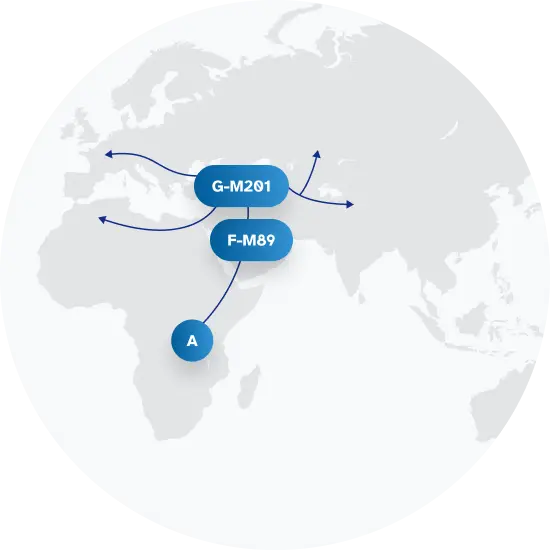Explore the Family Name Kay
How common is the last name Kay in the United States?
Based on the Decennial U.S. Census, the popularity of the surname "Kay" has seen a slight dip in rank between 2000 and 2010, moving from 1402 to 1467, a decrease of 4.64%. However, the actual count of individuals with the Kay surname increased by 4.95% during this same period, growing from 23,189 in 2000 to 24,337 in 2010. The proportion per 100k also fell slightly by 4.07%, indicating that while more people bear the surname, it's not keeping pace with overall population growth.
| 2000 | 2010 | Change | |
|---|---|---|---|
| Rank | #1,402 | #1,467 | -4.64% |
| Count | 23,189 | 24,337 | 4.95% |
| Proportion per 100k | 8.6 | 8.25 | -4.07% |
Race and Ethnicity of people with the last name Kay
In terms of ethnicity, the Decennial U.S. Census data shows shifts within the Kay surname bearers between 2000 and 2010. There was an increase in those identifying as Asian/Pacific Islander (up 8.44%), two or more races (up 28.00%), Hispanic (up 61.04%), and Black (up 12.84%). In contrast, the number of individuals identifying as White dropped by 2.46%, while the American Indian and Alaskan Native demographic saw a decrease of 18.67%. This suggests a growing diversity among individuals carrying the Kay surname.
| 2000 | 2010 | Change | |
|---|---|---|---|
| White | 87.8% | 85.64% | -2.46% |
| Black | 5.22% | 5.89% | 12.84% |
| Asian/Pacific Islander | 3.2% | 3.47% | 8.44% |
| Hispanic | 1.54% | 2.48% | 61.04% |
| Two or More Races | 1.5% | 1.92% | 28% |
| American Indian and Alaskan Native | 0.75% | 0.61% | -18.67% |
Kay ancestry composition
23andMe computes an ancestry breakdown for each customer. People may have ancestry from just one population or they may have ancestry from several populations. The most commonly-observed ancestry found in people with the surname Kay is British & Irish, which comprises 41.9% of all ancestry found in people with the surname. The next two most common ancestries are French & German (17.0%) and Ashkenazi Jewish (11.8%). Additional ancestries include Eastern European, Italian, Scandinavian, Spanish & Portuguese, and Iranian, Caucasian & Mesopotamian.
Ready to learn more about your ancestry? Get the most comprehensive ancestry breakdown on the market by taking our DNA test. Shop 23andMe
| ANCESTRY BREAKDOWN | COMPOSITION |
|---|---|
| British & Irish | 41.9% |
| French & German | 17.0% |
| Ashkenazi Jewish | 11.8% |
| Other | 29.3% |

Possible origins of the surname Kay
Your DNA provides clues about where your recent ancestors may have lived. Having many distant relatives in the same location suggests that you may all share common ancestry there. Locations with many distant relatives can also be places where people have migrated recently, such as large cities. If a large number of individuals who share your surname have distant relatives in a specific area, it could indicate a connection between your surname and that location, stemming from either recent ancestral ties or migration.
Based on 23andMe data, people with last name Kay have recent ancestry locations in the United Kingdom of Great Britain and Northern Ireland and Ireland.
| RECENT ANCESTRY Location | Percentage |
|---|---|
| Glasgow City, United Kingdom | 71.50% |
| Greater London, United Kingdom | 71.50% |
| Merseyside, United Kingdom | 71.20% |
| Greater Manchester, United Kingdom | 71.20% |
| West Midlands, United Kingdom | 70.80% |
What Kay haplogroups can tell you
Haplogroups are genetic population groups that share a common ancestor on either your paternal or maternal line. These paternal and maternal haplogroups shed light on your genetic ancestry and help tell the story of your family.
The top paternal haplogroup of people with the surname Kay is G-CTS10391, which is predominantly found among people with European ancestry. Haplogroup G-CTS10391 is descended from haplogroup G-M201. Other common haplogroups include R-CTS241 and J-CTS5368, which are predominantly found among people with European and European ancestry. Other surnames with similar common haplogroups are: Peters, Meyers, David, Cooper, Fox, Thompson, Schneider, Newman, Simon, Smith.
The most common maternal haplogroups of people with Kay surname are: H1, T2b, H. These most commonly trace back to individuals of European ancestry.
 Paternal Haplogroup Origins G-M201
Paternal Haplogroup Origins G-M201
Your paternal lineage may be linked to Ötzi the Iceman
Ötzi the Iceman was discovered in 1991, protruding from a snow-bank high in the Alps near the Austrian-Italian border. His 5,300-year-old remains turned out to be so well preserved that researchers were able to construct a detailed account of his life and death. Chemical analysis of Ötzi's teeth indicates he came from the Italian side of the Alps. He had suffered during the year before his death with whipworm, a stomach parasite that was found in his digestive tract. Yet he was fit enough to climb 6,500 feet in elevation during the day or two before he met his end in a rocky alpine hollow. Ötzi apparently was murdered, struck by a stone arrow point that was found lodged in his left shoulder. The twisted position of his body indicates that the murderer, or one of his accomplices, pulled the arrow's shaft out of Ötzi's prone body.Yet whoever killed Ötzi did not take the valuable and finely wrought copper axe that he carried with him — an indicator that at the age of 45, the Ice Man may have been a figure of some importance in his community. Recently, scientists who were able to extract DNA from Ötzi's remains discovered that he belonged to a paternal lineage that stems from haplogroup G-M201. Today, Ötzi's lineage reaches its highest levels in Sardinia and Corsica, and was once common among early European farmers.
Your maternal lineage may be linked to Marie Antoinette
Because it is so dominant in the general European population, haplogroup H also appears quite frequently in the continent's royal houses. Marie Antoinette, an Austrian Hapsburg who married into the French royal family, inherited the haplogroup from her maternal ancestors. So did Prince Philip, Duke of Edinburgh, whose recorded genealogy traces his female line to Bavaria. Scientists also discovered that famed 16th century astronomer Nicolaus Copernicus traced his maternal lineages to haplogroup H.

What do people with the surname Kay have in common?
Spoiler alert: it's complicated. People with the same last name are usually no more genetically similar than a randomly sampled group of people from the same population. That said, people with the same surname are more likely to have similar ancestries than randomly sampled individuals. The reason is the tendency of people with similar cultural or geographical backgrounds to preferentially mate with one another. That's why people who share a surname may be more likely to share traits and tendencies in common than people within the general population. Check out the percentages below to see the prevalences of tastes, habits, and traits of people with your surname compared with prevalences among 23andMe users.
Preferences
Traits
Habits
Wellness
Are health conditions linked to the last name Kay?
The short answer is that, if there is an association between surname and health, it's usually more about your ancestry than your name. Individuals with a given surname are no more genetically similar than the general population but often have similar ancestries. The populations of people associated with those shared ancestries often have sets of genetic variations, also known as alleles, in common. Some of those alleles are associated with a greater likelihood of developing certain diseases.
Disease variant frequency by ancestry
Disease allele frequencies in populations associated with the surname Kay are shown below. Important Note: not everyone with a disease allele will develop these health condition
























